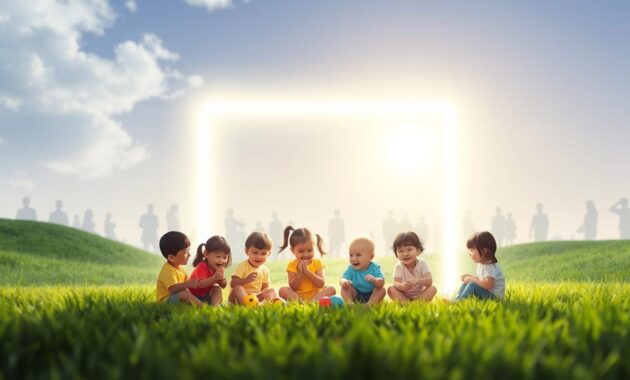The Australian government has made a big move. They want to ban Social Media for Children Under 16. This plan, led by Prime Minister Anthony Albanese, aims to keep young Australians safe online.
If passed, the bill could fine social media companies up to AU$50 million. This shows the government’s serious commitment to protecting kids from online dangers.
Many Australian parents find keeping their kids safe online very hard. Research shows that 95% of them struggle with this. Also, a lot of teens have seen harmful content online, like drug abuse and violence.
The Australian government’s decision is part of a global effort to protect young people. Countries like Spain and France are also thinking about raising the age limit for social media. They see it as a way to keep kids safe in the digital world.
Understanding Australia’s New Social Media Age Restriction Bill
Australia is working on a new law to keep kids under 16 safe on social media. The bill makes social media sites check if users are old enough before they can join. This is to stop kids from making accounts they shouldn’t have.
Key Components of the Legislation
The bill’s main points are:
- It requires social media sites to use age checks, like biometrics or ID cards.
- There’s no getting out of it by saying a parent said it’s okay.
- Platforms could face big fines, up to AU$50 million (US$33 million), if they don’t follow the rules.
Proposed Penalties and Enforcement Measures
The fines for not following the age rules could be as high as AU$50 million (US$33 million). This shows how serious the Australian government is about keeping kids safe online.
Timeline for Implementation
If the bill passes, social media sites will have a year to set up age checks. This gives them time to change how they work and make sure everything goes smoothly.
Australia’s new law is seen as one of the toughest in the world. It’s all about keeping kids safe online. The law has strong rules and a clear plan for when it starts, showing the government’s commitment to protecting children.
The Scope of Social Media Platforms Affected by the Ban
The Australian government wants to ban social media for kids under 16. This would change the digital world a lot. Big names like X (formerly Twitter), TikTok, Facebook, Instagram, Snapchat, and Reddit would be affected. These sites are big hits with young Aussies and can lead to cyberbullying and harm to mental health.
The aim is to make Australia safer for young people online. By limiting access, the government hopes to protect them from the dangers of social media. This includes harmful content and cyberbullying.
But, there are some exceptions. Messaging apps, online games, and health or educational sites won’t be banned. This shows the government wants to keep some digital tools useful for kids’ learning and growth.

The ban on popular social media sites shows Australia’s serious effort to keep young people safe online. By doing this, Australia wants to create a better digital space for its youth. This is all about youth online safety and stopping cyberbullying.
Australia launches ‘landmark’ Bill to ban social media for children under 16
The Australian government has made a big move to keep kids safe online. They’ve introduced a bill to block social media for anyone under 16. This is because of worries about kids seeing bad stuff online, like drug use, suicide, and violence.
Government’s Rationale Behind the Age Restriction
There are scary stats behind this bill. The Minister for Communications says almost two-thirds of teens have seen very bad content online. Also, a quarter have seen stuff about bad eating habits. The government wants to stop this by keeping social media out of kids’ hands.
Expected Impact on Platform Operations
This bill will change how social media works. Companies that don’t follow the age rules could get fined up to AU$50 million. They’ll use things like fingerprints or ID to check ages.
This law does more than just block sites. Some apps, like YouTube and WhatsApp, won’t be banned. They help with learning, messaging, and mental health for kids.

“95% of Australian caregivers find online safety to be one of their toughest parenting challenges,” said the Minister for Communications.
This bill shows Australia’s serious about keeping kids safe online. They want to protect young people and make the internet a safer place for them.
Age Verification Systems and Implementation Challenges
Australia is taking a big step by banning social media for kids under 16. A key part of this is setting up an age-verification system. This system will check if users are old enough to be on social media, helping keep young people safe.
The government will test different age-checking methods, like biometrics and ID cards. They’re working with Age Check Certification Scheme to find the best ways to verify ages accurately.
But, setting up this system won’t be easy. Keeping user privacy safe is a big concern. The bill says platforms must delete personal info used for age checks unless users agree to share it. Finding a way to verify ages without invading privacy is a big challenge.
As age verification, parental control measures, and internet regulation plans are made, it’s important for everyone to work together. They need to make sure the system is safe and easy to use.
“The proposed age-verification system in Australia’s social media ban bill represents a bold step forward in protecting younger users, but its success will depend on finding the right balance between effective implementation and preserving individual privacy,” explains an industry expert.
The age-verification system is a big deal for Australian youth. Its success will be watched closely and talked about a lot.

Impact on Australian Youth and Digital Social Networks
The Australian government is considering a bill to ban social media for kids under 16. This has sparked a lot of talk about how it might affect young people and their online lives. Research shows that keeping kids safe online is a big worry for parents, with 95% of them concerned.
Statistical Data on Harmful Content Exposure
The new law aims to stop kids from seeing harmful stuff online. This includes things like drug use, suicide, self-harm, and bad eating habits. Here are some stats:
- Almost two-thirds of 14- to 17-year-old Australians have seen very harmful content online.
- A quarter of young Australians in the 14- to 17-year-old range have seen content about unsafe eating habits.
- Over a third of 8- to 12-year-olds in Australia have used messaging apps, while nearly half have used short-form video apps like Snapchat and TikTok.
Mental Health Considerations
Mental health is a big reason for the proposed law. The government wants to make the internet safer for young people. They think limiting social media will help protect their mental well-being. But some experts are worried that laws might not solve the problem of social media and mental health issues in youth.
“The proposed ban on social media for under-16s in Australia is a bold and controversial move, sparking intense debates about the role of technology in young people’s lives. While the government’s intent to protect youth online safety is admirable, the long-term impact on cyberbullying prevention and digital social networks remains to be seen.”
Exemptions and Special Considerations in the Bill
The Australian government wants to ban social media for kids under 16. This move aims to give parents more control and keep the internet safe for young people. But, the bill also has some exceptions and special rules.
Not all online sites are seen as risky. Messaging services, online games, and platforms that help with health and education won’t be banned. Sites like YouTube, Google Classroom, WhatsApp, and Headspace might still be available for kids. This is because these services don’t use the same tricks as social media to keep users hooked.
“While risks exist on these platforms, they do not face the same level of algorithmic content curation and psychological manipulation as social media. We want to ensure young Australians can still access essential educational and health resources online.”
The bill also promises strong privacy for kids’ data. The government wants to make sure the age-check system is safe and respects kids’ online rights.
The Australian government is taking a careful approach. They want to regulate the internet but also keep it open for learning and growth. The bill’s exceptions and special rules aim to protect kids while letting them use the internet wisely.
Global Context: Similar International Social Media Regulations
Nations worldwide are trying to protect kids in the digital world. Australia’s plan to ban social media for under-16s is not alone. Many countries are looking at similar rules to keep young users safe.
Comparison with European Initiatives
In Europe, some countries are leading the way. Spain wants to make 16 the minimum age for social media. France is considering a ban for those under 15, but with a way for parents to say yes.
US Approach to Youth Online Protection
In the US, there’s a strong focus on keeping kids safe online. Florida plans to ban social media for kids under 14 in 2024. The US also requires tech companies to get permission from parents for kids under 13.
Australia’s ban is among the strictest globally. It shows the country’s commitment to protecting kids online.
| Country | Proposed Regulation | Age Limit |
|---|---|---|
| Spain | Raise minimum age for social media | 16 years old |
| France | Ban for users under 15, with parental consent option | 15 years old |
| United States | Florida to ban social media for children under 14, US requires parental consent for under 13 | 14 years old (Florida), 13 years old (US) |
| Australia | Proposed ban for users under 16 | 16 years old |
These global efforts show a growing need to protect kids online. As the digital world changes, policymakers aim to keep kids safe while still allowing innovation.
Industry Response and Platform Adaptations
Australia is set to ban social media for kids under 16. The digital industry is worried and has some ideas. The Digital Industry Group Inc. says they need more time to talk about the new law.
They think social media sites already do a lot to keep kids safe. They worry that banning it could make things worse. Instead, they suggest improving safety features together.
Social media companies are looking at how to meet the new rules. They might use stronger age checks, tools for parents, and more educational content. This is to help kids and their parents stay safe online.
“The industry is committed to working closely with the government to ensure the protection of young Australians online without unintentionally pushing them towards less secure online spaces.”
The debate on social media platforms, internet regulation, and youth online safety is ongoing. The industry’s openness to change and work with lawmakers is key. It will shape how young Australians use the internet in the future.
Parental and Expert Perspectives on the Ban
In Australia, the debate on a new social media age restriction bill is heating up. Parents and experts have mixed views. Many parents see it as a step to keep their kids safe online. But some experts think it might not solve all the problems of young people’s digital lives.
UNICEF Australia’s Katie Maskiell fears the ban could lead to more danger for teens. They might go to secret online places instead. Child welfare and internet experts also worry about cutting off 14- and 15-year-olds from social networks. They say this could harm their growth and social skills.
The need for strong parental control measures and child protection laws is clear. Almost all Australian parents struggle with keeping their kids safe online. And, nearly two-thirds of teens have seen very harmful content. The bill tries to tackle this big issue. But, we need to watch how it works and work together to help our digital kids.



